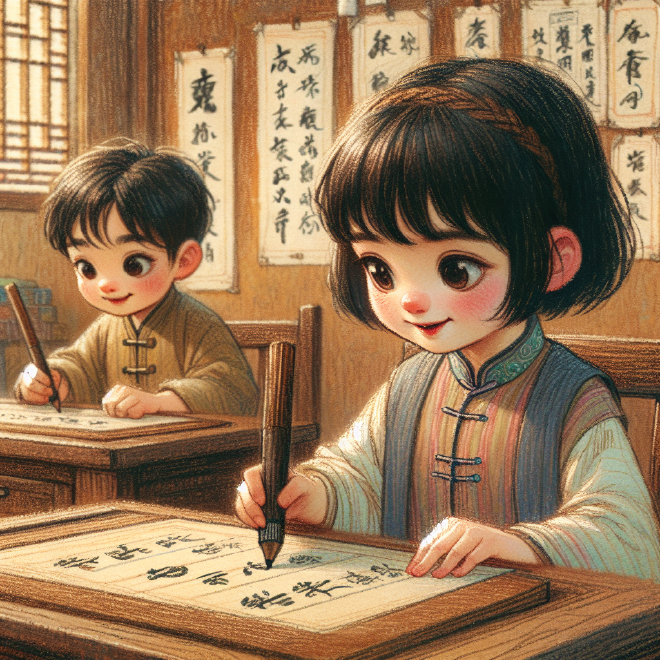月光下的告别

Table of Contents
Audio #
汉字 #
丽丽和小明是好朋友。他们都喜欢学习新的东西。今天,他们的老师教他们用毛笔写字。
一开始,丽丽觉得很难。她握毛笔的姿势不太正确,所以写出来的字歪歪扭扭的。小明也觉得不容易,墨水常常滴到纸上,弄得一片黑。
“没关系,丽丽,” 小明说,“我们一起努力!我可以帮你调整握笔的姿势。” 丽丽也鼓励小明:“你写得越来越好了!下次小心一点,墨水就不会滴下来了。”
他们互相帮助,互相鼓励。丽丽练习握笔,小明练习控制墨水。经过一段时间的练习,他们都进步了很多。
最后,他们终于成功地写出了漂亮的“春天”二字。丽丽写的“春”字像一棵小树,充满了生机。小明写的“天”字像蓝色的天空,非常开阔。
他们看着自己写的字,感到非常高兴。他们明白了,只要努力学习,互相帮助,就能克服困难,取得成功。
Pinyin #
Lìlì hé Xiǎomíng shì hǎo péngyou. Tāmen dōu xǐhuan xuéxí xīn de dōngxi. Jīntiān, tāmen de lǎoshī jiāo tāmen yòng máobǐ xiě zì.
Yī kāishǐ, Lìlì juéde hěn nán. Tā wò máobǐ de zīshì bù tài zhèngquè, suǒyǐ xiě chūlái de zì wāiwāiniūniū de. Xiǎomíng yě juéde bù róngyì, mòshuǐ chángcháng dī dào zhǐ shàng, nòng de yī piàn hēi.
“Méi guānxi, Lìlì,” Xiǎomíng shuō, “wǒmen yīqǐ nǔlì! Wǒ kěyǐ bāng nǐ tiáozhěng wò bǐ de zīshì.” Lìlì yě gǔlì Xiǎomíng: “Nǐ xiě de yuè lái yuè hǎo le! Xià cì xiǎoxīn yīdiǎn, mòshuǐ jiù bù huì dī xiàlái le.”
Tāmen hùxiāng bāngzhù, hùxiāng gǔlì. Lìlì liànxí wò bǐ, Xiǎomíng liànxí kòngzhì mòshuǐ. Jīngguò yī duàn shíjiān de liànxí, tāmen dōu jìnbù le hěn duō.
Zuìhòu, tāmen zhōngyú chénggōng de xiě chū le piàoliang de “chūntiān” èr zì. Lìlì xiě de “chūn” zì xiàng yī kē xiǎo shù, chōngmǎn le shēngjī. Xiǎomíng xiě de “tiān” zì xiàng lánse de tiānkōng, fēicháng kāikuò.
Tāmen kànzhe zìjǐ xiě de zì, gǎndào fēicháng gāoxìng. Tāmen míngbai le, zhǐyào nǔlì xuéxí, hùxiāng bāngzhù, jiù néng kèfú kùnnan, qǔdé chénggōng.
English Translation #
Lili and Xiaoming are good friends. They both like to learn new things. Today, their teacher taught them how to write with a calligraphy brush.
At first, Lili found it difficult. Her grip on the brush wasn’t quite right, so the characters she wrote were crooked. Xiaoming also found it challenging; ink often dripped onto the paper, making it a mess.
“It’s okay, Lili,” Xiaoming said, “let’s work hard together! I can help you adjust your grip on the brush.” Lili also encouraged Xiaoming: “You’re writing better and better! Be a little more careful next time, and the ink won’t drip down.”
They helped and encouraged each other. Lili practiced her grip, and Xiaoming practiced controlling the ink. After practicing for a while, they both improved a lot.
Finally, they successfully wrote the beautiful characters “春天” (chūntiān - Spring). The “春” (chūn - Spring) character written by Lili looked like a small tree, full of vitality. The “天” (tiān - Sky) character written by Xiaoming looked like the blue sky, very vast.
They looked at the characters they had written and felt very happy. They understood that as long as they studied hard and helped each other, they could overcome difficulties and achieve success.
Grammatical Points and Analysis #
Adverbs of Degree: #
- 很 (hěn): Very. E.g., 很难 (hěn nán) - very difficult, 非常高兴 (fēicháng gāoxìng) - extremely happy.
Resultative Complements: #
- 写出来 (xiě chūlái): Write out; the result of writing something. Here, 出来 indicates that the writing has produced something tangible, something that now exists.
連词 (Conjunctives): #
- 只要。。。就。。。(zhǐyào… jiù…): As long as… then… This construction indicates a conditional relationship.
- 所以 (suǒyǐ): So, therefore.
Directional Complements: #
- 下来 (xiàlái): Down. Used in “滴下来 (dī xiàlái)” – drip down.
Verb-Object Phrases: #
- 学习东西 (xuéxí dōngxi): To learn things.
- 写字 (xiě zì): To write characters.
- 调整姿势 (tiáozhěng zīshì): To adjust posture.
- 控制墨水 (kòngzhì mòshuǐ): To control ink.
Comparatives: #
- 越来越好 (yuè lái yuè hǎo): getting better and better
Questions #
Question 1:
English: Why did Lili and Xiaoming feel happy at the end of the story? Pinyin: Wèi shénme Lìlì hé Xiǎomíng zài gùshì de zuìhòu gǎndào gāoxìng?
Question 2:
English: What did Lili and Xiaoming learn from this experience of practicing Chinese calligraphy? Pinyin: Lìlì hé Xiǎomíng cóng zhè cì liànxí zhōngguó shūfǎ de jīngyàn zhōng xué dào le shénme?
Click to show the answer
answer Question 1 #
English: They felt happy because they successfully wrote beautiful characters and realized that they could overcome difficulties by working hard and helping each other. Pinyin: Tāmen gǎndào gāoxìng yīnwèi tāmen chénggōng de xiě chū le piàoliang de hànzì, bìngqiě míngbai le tōngguò nǔlì xuéxí hé hùxiāng bāngzhù kěyǐ kèfú kùnnan.
answer Question 2 #
English: They learned that as long as they study hard and help each other, they can overcome difficulties and achieve success. Pinyin: Tāmen xué dào le zhǐyào nǔlì xuéxí hé hùxiāng bāngzhù, jiù néng kèfú kùnnan, qǔdé chénggōng.
Disclaimer: This story is purely fictional and generated by AI. Any similarities to real people, places, or events are purely coincidental.